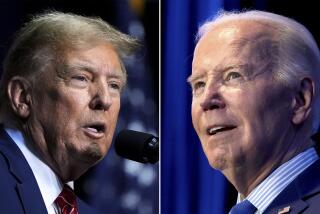Clinton, Bush Win Kentucky Primary Races : Campaign: Both had wide margins of victory. Perot showed his appeal as uncommitted voters turned out in strength.
- Share via
Arkansas Gov. Bill Clinton won the Kentucky Democratic presidential primary Tuesday and vied for victory in two other states as he drove toward his party’s nomination. Ross Perot flashed his appeal as “uncommitted” voters turned out in strength in Republican and Democratic races.
Arkansas and Idaho voted as well, in a prelude to next week’s six-state primary finale.
Perot supporters in Kentucky were urged in advance to use the uncommitted line to register their support for the Texas billionaire, who is likely to run as an independent candidate for the White House this fall.
In the Democratic race in Kentucky, Clinton was gaining 56% of the vote, to 28% for uncommitted, with returns counted from 94% of the precincts. A fading Edmund G. (Jerry) Brown Jr. pulled 8%.
President Bush won the Kentucky Republican primary. With 93% of the precincts counted, he had 74% to 26% for uncommitted. Conservative rival Patrick J. Buchanan was not on the ballot.
Bush was certain to win in Arkansas and Idaho as well, and has already clinched renomination.
There seemed no doubt that Clinton would win the Democratic nomination, and he seemed on track to reach the target of 2,145 delegates when California and five other states close out the primary season next Tuesday. Clinton has not lost a primary since Connecticut in March. He began the night with 1,913 delegates.
There were 88 delegates at stake in Kentucky and Arkansas. Idaho’s Democratic primary was for bragging rights, since its delegates were picked by caucus earlier in the year.
Perot’s Kentucky chairman, Charles Hellebusch, said his man claimed no credit for the large uncommitted vote in the state. “Our look is to November and we don’t have time to really get into that,” Hellebusch said.
Advisers to Clinton and Bush have become increasingly absorbed in recent weeks with countering Perot’s seemingly effortless rise in the polls.
Clinton, campaigning in Ohio, had a one-word answer when asked if he was worried about Perot’s impact on his chances of election. “No,” he said, then launched into a recitation of his accomplishments as governor.
Pollsters have reported voter dissatisfaction with existing candidates all year. Interviews with voters leaving their polling places last week in Oregon’s primary found 15% support for Perot among Republicans, and 13% among Democrats.
No exit polls were conducted in Kentucky, Arkansas or Idaho, and, thus, there was no way to gauge Perot’s support.
In a jarring reminder of the furor over the House bank scandal, nine-term Democratic Rep. Carroll Hubbard Jr. of Kentucky trailed businessman Tom Barlow. The veteran lawmaker wrote 152 bad checks at the bank. His wife, Carol, lost her bid for the party’s nomination from a different district.
Voters in Arkansas rendered judgment on Reps. Beryl Anthony Jr. and Bill Alexander, two veteran lawmakers who wrote numerous bad checks at the House bank.
The Arkansas governor voted for himself in Little Rock before flying to Ohio to campaign for next week’s primary.
Asked about the Perot phenomenon, Clinton said: “There’s nothing I can do about that. I’m not out there running against him.”
Clinton’s apparent lock on the nomination, Bush’s certain nomination and Perot’s ascendancy left Brown and Buchanan as footnotes to the 1992 campaign.
“I’m hoping for as many delegates as God will deliver,” Brown said as he campaigned in New Jersey. He began the night with 394.
More to Read
Get the L.A. Times Politics newsletter
Deeply reported insights into legislation, politics and policy from Sacramento, Washington and beyond. In your inbox twice per week.
You may occasionally receive promotional content from the Los Angeles Times.










